A kindergarten readiness checklist helps identify essential skills children should master before starting school. It covers cognitive, social, emotional, and physical development, ensuring a smooth transition to formal education.
Understanding the Importance of Kindergarten Readiness
Kindergarten readiness is crucial for a child’s smooth transition to formal education. It ensures they possess foundational skills in cognitive, social, emotional, and physical development. A readiness checklist helps identify areas of strength and improvement, guiding parents and educators to support overall growth. By addressing these skills early, children build confidence and a strong foundation for future academic success.
How to Use the 2023 Kindergarten Readiness Checklist
The 2023 Kindergarten Readiness Checklist is a valuable tool for assessing a child’s preparedness for school. Parents and educators can use it to evaluate skills like counting, shape recognition, and vocabulary. Review each category, noting strengths and areas needing attention. Use the checklist to create engaging activities and monitor progress, ensuring a smooth transition to kindergarten. Regular updates and tailored strategies can enhance a child’s readiness and confidence.
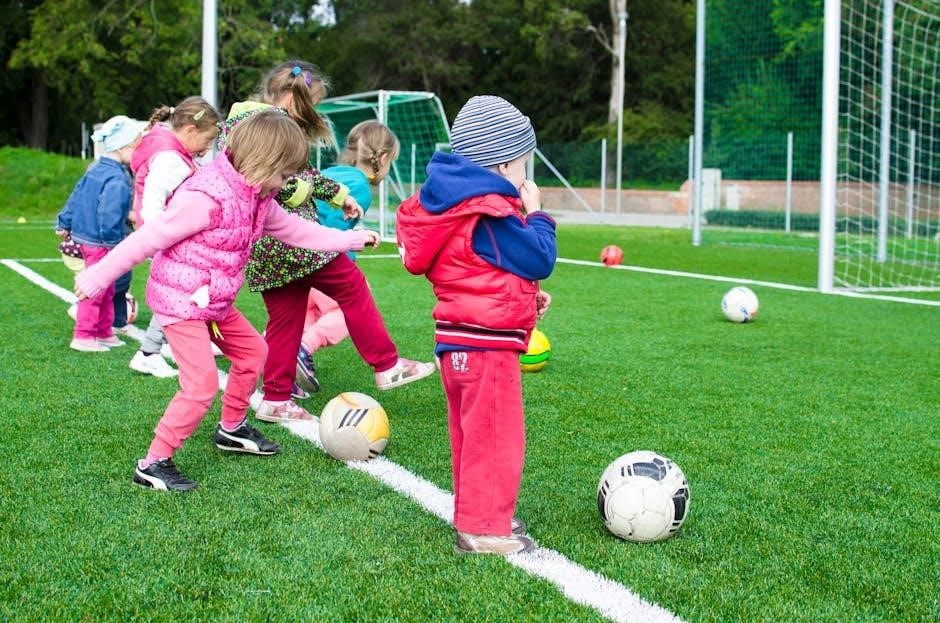
Cognitive and Math Skills
Cognitive and math skills include counting up to 20, recognizing shapes and colors, and understanding basic number concepts, forming the foundation for math and problem-solving abilities.
Counting and Basic Number Concepts
Children should demonstrate an understanding of basic number concepts, such as counting up to 20 and recognizing numbers up to 10. They should also show “one-to-one correspondence,” matching numbers to objects. Additionally, they should understand basic sequencing and sorting objects by size or shape. These skills form the foundation for math and problem-solving abilities in kindergarten, helping them recognize patterns and relationships between numbers and objects.
Recognizing Shapes and Colors
Children should identify basic shapes like squares, circles, triangles, and rectangles. They should also recognize and name primary colors such as red, blue, and yellow. Understanding these concepts enhances visual discrimination and cognitive development. These skills are foundational for math, art, and problem-solving activities in kindergarten, helping them recognize and replicate patterns and shapes in their environment.
Basic Problem-Solving Abilities
Children should demonstrate basic problem-solving skills, such as exploring solutions to simple challenges and understanding cause-and-effect relationships. They should be able to approach problems with curiosity and persistence, using critical thinking to navigate everyday situations. These skills help build confidence and independence, preparing them to tackle academic and social challenges in kindergarten. Encouraging exploration and creativity fosters strong foundational problem-solving abilities.
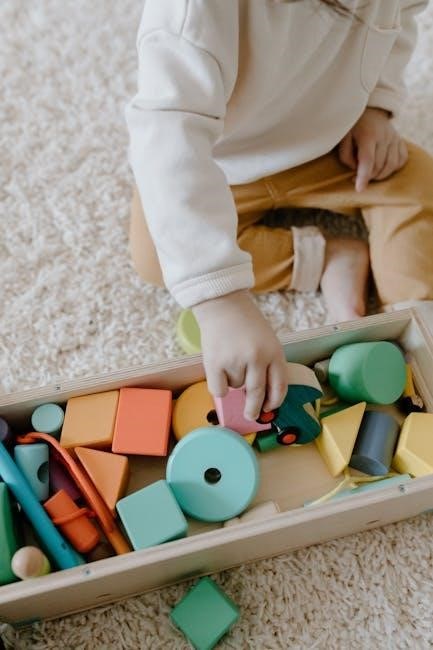
Language and Communication Skills
Children entering kindergarten should speak clearly, express thoughts, and listen attentively. They should understand basic vocabulary and follow directions, laying the foundation for effective communication and learning.
Speaking in Complete Sentences
Speaking in complete sentences is a key language skill for kindergarten readiness. Children should express thoughts clearly, using appropriate grammar and sentence structure. They should articulate needs and wants effectively, demonstrating an understanding of basic communication. This skill helps in describing experiences, sharing ideas, and engaging in conversations, which are essential for social interactions and academic success in a classroom setting.
Listening and Following Directions
Listening and following directions is a fundamental skill for kindergarten success. Children should demonstrate the ability to understand and carry out simple instructions, such as completing tasks or moving to a new activity. They should also show an awareness of verbal cues and respond appropriately, which fosters better classroom behavior and participation in group activities. This skill enhances their ability to learn and engage effectively in a structured environment.
Understanding and Using Vocabulary
Understanding and using vocabulary is crucial for kindergarten readiness. Children should recognize and name basic objects, shapes, and colors, demonstrating an awareness of word meanings. They should also begin to use words to communicate thoughts and needs effectively. Recognizing simple sight words and understanding basic categories, such as animals or vehicles, further supports their language development and readiness for formal education.
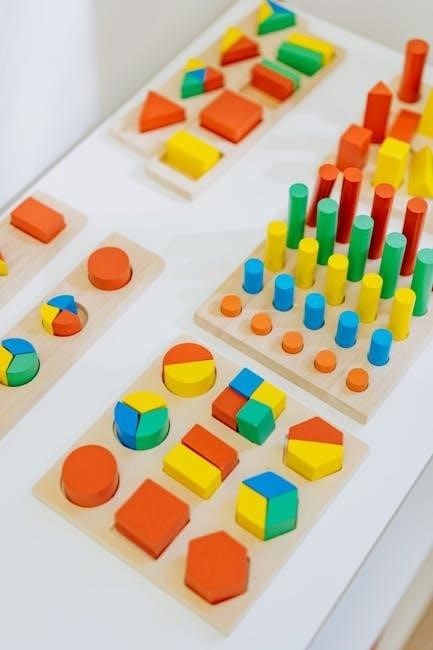
Social and Emotional Development
Social and emotional development involves interacting with peers, cooperating, and showing empathy. These skills help children navigate classroom environments and build positive relationships with teachers and classmates.
Sharing and Cooperating with Others
Children should demonstrate the ability to share toys and materials, take turns, and collaborate in group activities. Cooperation fosters friendship and teamwork, essential for a positive classroom experience. Encouraging these behaviors helps children develop empathy and respect for others, laying a strong foundation for social success in kindergarten and beyond.
Expressing Emotions Appropriately
Children should learn to recognize, express, and manage their emotions in healthy ways. This includes identifying feelings like happiness, sadness, or anger and communicating them verbally. Teaching appropriate emotional responses helps children develop self-awareness and builds a foundation for positive social interactions and emotional well-being in kindergarten.
Showing Independence in Activities
Children should demonstrate independence by completing simple tasks without excessive assistance, such as using scissors, drawing, or solving basic problems. They should show initiative in starting activities and confidence in making decisions. Encouraging independence helps build self-reliance and prepares them for classroom expectations where they will work on tasks and projects with minimal supervision.

Physical and Motor Skills
Children should demonstrate coordination, hand-eye alignment, and dexterity. Skills include using scissors, gripping pencils, and tracing lines. These abilities are vital for classroom activities and creativity.
Using Scissors, Glue, and Other Tools
Mastery of scissors, glue, and other tools is crucial for fine motor development. Children should safely cut straight lines, apply glue appropriately, and handle materials like paint and crayons. This skill enhances hand-eye coordination and prepares them for crafts and writing activities. Encouraging practice with these tools fosters independence and creativity, essential for kindergarten success.
Gripping Pencils and Crayons Correctly
Correctly gripping pencils and crayons is a foundational skill for kindergarten. Children should hold tools with their thumb and index finger, resting on the middle finger. This proper grip improves control and precision, essential for drawing and writing. Encourage practice with various tools to build dexterity and confidence, ensuring they can create legible marks and shapes, a key readiness indicator for early academic success.
Tracing Lines and Basic Drawing
Tracing lines and basic drawing are essential skills for kindergarten readiness. Children should be able to follow straight and curved lines accurately, demonstrating hand-eye coordination. They should draw simple shapes like circles, squares, and triangles, and create basic figures, such as people or animals. This skill lays the foundation for writing letters and numbers. Encourage practice with large crayons or markers to refine motor control and creativity, making it a fun and engaging activity for young learners.
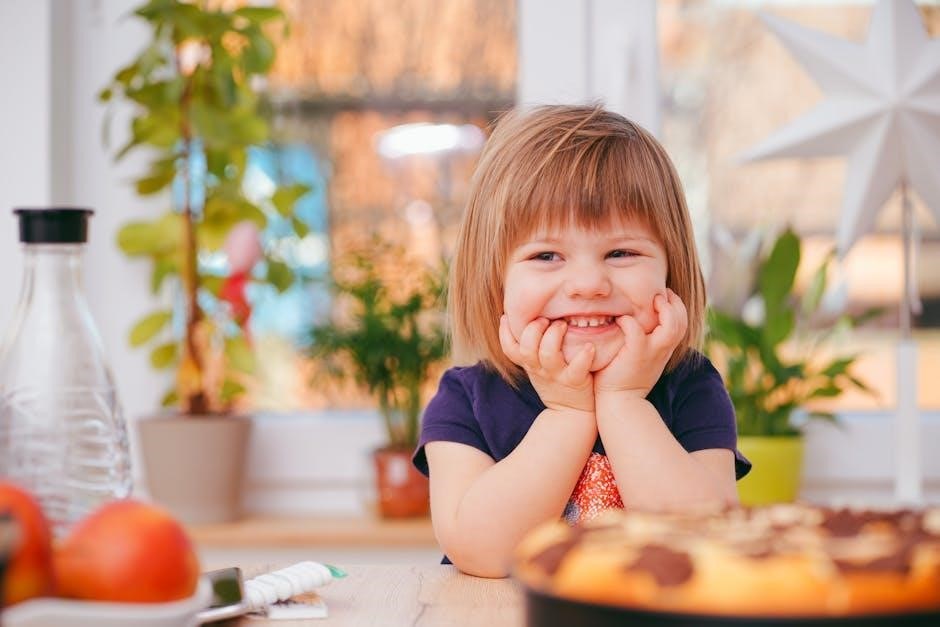
Self-Care and Independence
Children should demonstrate ability to use the toilet independently, dress and undress without assistance, and feed themselves using utensils. Basic hygiene practices are also encouraged.
Using the Toilet Independently
Children should demonstrate the ability to use the toilet independently, including wiping themselves properly and pulling up their pants. This skill is a key indicator of readiness for kindergarten, as it promotes self-reliance and reduces the need for adult assistance. Mastery of this skill also contributes to a smoother transition to school, where independence in self-care is expected and encouraged.
Dressing and Undressing Without Assistance
Children should be able to dress and undress independently, including managing zippers, buttons, and shoes. This skill is crucial for kindergarten readiness, as it fosters self-reliance and confidence. Being able to handle clothing independently allows children to participate fully in school activities and transitions smoothly between lessons and playtime without requiring constant adult support.
Feeding Themselves Using Utensils
Children should demonstrate the ability to feed themselves using utensils like spoons, forks, and knives safely and effectively. This skill promotes independence during meals and reduces reliance on others. While minor spills may still occur, your child should show coordination in bringing food to their mouth and wiping up afterwards, preparing them for self-sufficiency in a kindergarten setting.
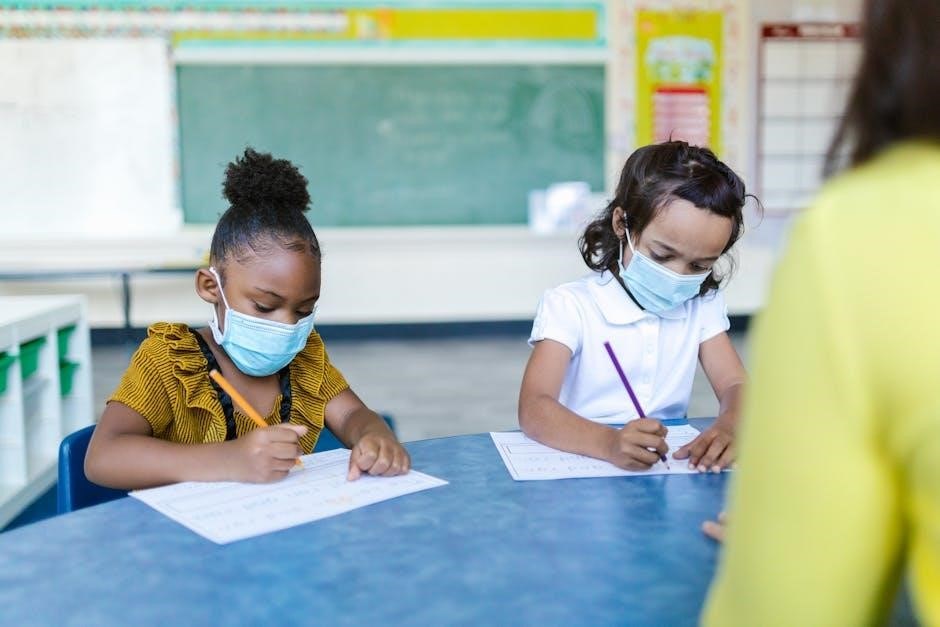
Additional Life Readiness Skills
Children should show curiosity, adapt to routines, and separate comfortably from parents. Understanding basic time concepts and demonstrating interest in learning are key life readiness skills.
Separating from Parents or Caregivers
Children should demonstrate the ability to separate from parents or caregivers calmly. This skill is crucial for a smooth transition to kindergarten, as it reduces anxiety and fosters independence. The child should be able to engage in activities independently and handle short periods of separation without distress. Understanding that parents will return helps build trust and confidence, making the kindergarten experience less overwhelming.
Understanding Basic Time Concepts
Children should grasp fundamental time concepts, such as understanding day and night, yesterday, today, and tomorrow. They should recognize routines and sequences, like finishing one activity before starting another. Demonstrating patience while waiting and following simple schedules is key. Introducing visual aids like calendars or timers can help reinforce these concepts, making the transition to structured school environments smoother and more manageable.
Showing Curiosity and Interest in Learning
Children should demonstrate curiosity by asking questions and exploring their surroundings. They should show interest in books, activities, and new experiences, fostering a love for learning. Encouraging this trait helps build confidence and prepares them to engage actively in classroom environments. A curious child is more likely to approach challenges with enthusiasm and resilience, laying a strong foundation for future academic success and social growth.
The kindergarten readiness checklist serves as a valuable tool to ensure children are well-prepared for their educational journey. It fosters confidence, curiosity, and essential life skills for lifelong learning.
Using the Checklist Effectively
The Kindergarten Readiness Checklist is a valuable tool to assess your child’s readiness across cognitive, social, emotional, and physical domains. Use it to identify strengths and areas needing support, fostering targeted practice and growth. Collaborate with educators to create personalized plans, ensuring a smooth transition to kindergarten. Regularly review and update progress to monitor development and celebrate milestones, helping your child feel confident and prepared for their educational journey.
Encouraging a Growth Mindset
Fostering a growth mindset in your child is crucial for their long-term success. Teach them that abilities can grow with effort, persistence, and practice. Praise their effort, not just results, and encourage them to view challenges as opportunities to learn. Celebrate progress, no matter how small, and help them understand that mistakes are part of the learning process. This mindset will empower your child to approach kindergarten and beyond with confidence and resilience.

